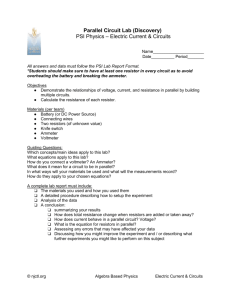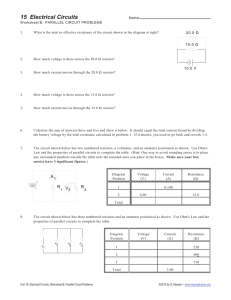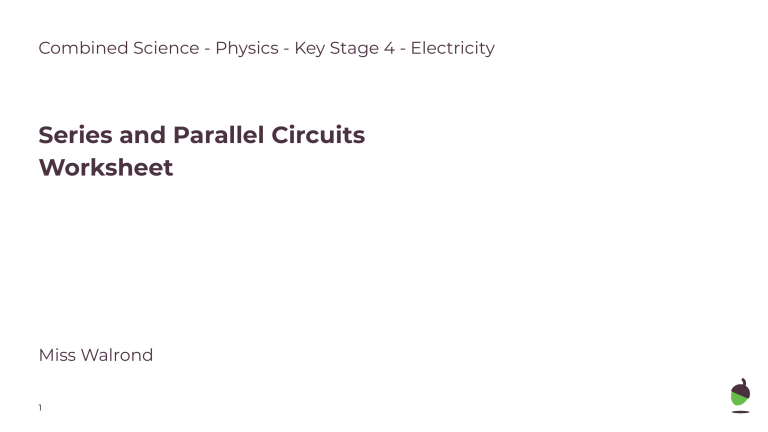
Combined Science - Physics - Key Stage 4 - Electricity Series and Parallel Circuits Worksheet Miss Walrond 1 Q1. Alyssia is doing electricity experiments. Alyssia investigates the current in circuits made from cells and lamps. All the cells are alike and all the lamps are alike. Here are four circuits she connects up. Each circuit contains an ammeter. For each statement choose the correct circuit. Put a letter A, B, C or D in each box to show your choice. You can use each letter once, twice or not at all. (i) The ammeter in this circuit has the smallest reading. [1] (ii) The ammeter in this circuit has the greatest reading. [1] (iii) In these TWO circuits the lamps are connected in and parallel. OCR, Twenty First Century Physics B, A182/01, June 2017. [1] 2 Q2. Riya connects an electrical circuit. The voltmeter reading is 3.0 V. The ammeter reading is 1.5A. i. Calculate the resistance of the lamp. answer ......................................... ohms [2] Ii.. Riya wants to decrease the total resistance of the circuit. She cannot change the voltage. Describe two changes she could make to this electrical circuit to decrease the total resistance. OCR, Gateway Physics, B752/02, June 2017. 3 [2] Answers 4 Q1 1. i. C 1 ii. D 1 iii. B and D 1 (both needed). 2. i. 2 3 / 1.5 (if answer is incorrect or incomplete) ii. Any two from: Reduce the setting on the variable resistor Remove the lamp or variable resistor Make the wires shorter Use thicker wire Place resistor and lamp in parallel 5 2 1 1 1 1 1 1 In lesson questions 6 Independent Task - Series and Parallel Copy and complete the table using the text below. (Hint: you will need to sort the statements) Series Parallel Current Potential difference The current is the same through each component. The potential difference splits between components. The potential difference across each branch is the same. The current splits between branches. 7 Independent Task 1 - application of series and parallel Copy and complete the sentences using the words below. You can use words, once, more than once or not at all. 1) When we add another lamp into a series circuit, the total resistance ____________, this means that the total current _______________. Also, the potential difference across each of the lamps ______________. This means that the lamps all become _____________. 2) When we add another lamp into a parallel circuit in a new branch, the total resistance _________________, the current through each lamp _____________. Also, the potential difference across each of the lamps ____________. This means that the lamps have the same brightness. increases 8 decreases is the same brighter dimmer Independent Task 2 - application of series and parallel Lydia is comparing series and parallel circuits in a class practical. Put a tick (✔) in the box next to the correct answer. The reading on A1 is less than the reading on A2. The total resistance in circuit B is 6 Ω. Answers as discussed in the next 3 slides have not been seen or verified by OCR. The p.d. across the 8 Ω is the same in both circuits. The p.d. across A2 is very large OCR, Twenty First Century Physics, Paper j259, Specimen. 9 [1] Independent Task - Combining Cells Answer the questions below. 1) Assume that the cells all have a voltage of 2 V. Write down the battery voltage. 2) Assume that the cells have a voltage of 9 V. Write down the battery voltage. 3) Describe what happens to the current when two cells are combined a) in series. b) in parallel. 10 Worked Example 3 Tim sets up this parallel circuit. i. What is the voltage between points X and Y? voltage = ......................................................................... V [1] ii. All the resistors have the same resistance. What is the current through point Z? current = ......................................................................... A [1] OCR, Twenty First Century Physics, Paper A182, June 2016. 11 Independent Task: Series and Parallel The resistors in this circuit are identical and have a resistance of 30 ꭥ. Each resistor is identical and has a 1) Calculate the current through resistor 1. resistance of 10 ꭥ. Calculate the 2) Calculate the current through the second current through each resistor, and the potential difference across each resistor. branch. 3) Explain your answer to question 2. 4) Calculate the potential difference across resistors 2 and 3 Images, Miss Walrond 12 Answers 13 Independent Task Series Parallel Current The current is the same The current splits through each component. between branches. Potential difference The potential difference splits between components. 14 The potential difference across each branch is the same. Independent Task Copy and complete the sentences using the words below. You can use words, once, more than once or not at all. 1) When we add another lamp into a series circuit, the total resistance increases decreases ____________, this means that the total current _______________. Also, decreases the potential difference across each of the lamps ______________. This dimmer means that the lamps all become _____________. 2) When we add another lamp into a parallel circuit in a new branch, decreases the total resistance _________________, the current through each lamp is the same _____________. Also, the potential difference across each of the lamps is the same This means that the lamps have the same brightness. ____________. 15 Independent Task 2 - application of series and parallel Lydia is comparing series and parallel circuits in a class practical. Put a tick (✔) in the box next to the correct answer. The reading on A1 is less than the reading on A2. The total resistance in circuit B is 6 Ω. Answers as discussed in the next slide have not been seen or verified by OCR. The p.d. across the 8 Ω is the same in both circuits. The p.d. across A2 is very large OCR, Twenty First Century Physics, Paper j259, Specimen. 16 [1] Review: Independent Task - Combining Cells 1) Assume that the cells all have a voltage of 2 V. Write down the battery voltage. 4V 2V 2) Assume that the cells have a voltage of 9 V. Write down the battery voltage. 18 V 9V 3) Describe what happens to the current when two cells are combined a) in series. The current will increase. b) in parallel. The current will increase. 17 Review: Independent Task: Series and Parallel The resistors in this circuit are identical and have a resistance of 30 ꭥ. Each resistor is identical and has a 1) Calculate the current through resistor 1. resistance of 10 ꭥ. Calculate 2) Calculate the current through the second branch. a) the current through each resistor b) potential difference across each 3) Calculate the potential difference across resistors 2 and 3 resistor. Images, Miss Walrond 18

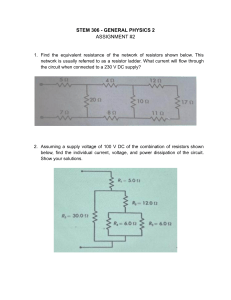
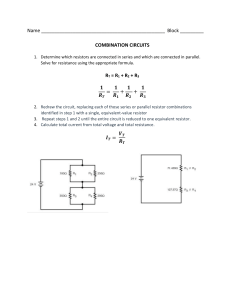
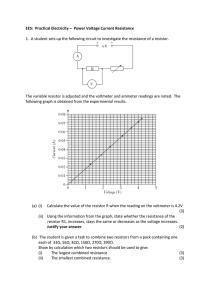
![sheet 3 electric circuits[2]](http://s2.studylib.net/store/data/026183691_1-6b03f70d4f07d30f02a70c2aa3ef4720-300x300.png)
